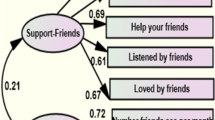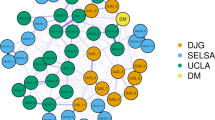Abstract
At first, the study describes the hierarchy in types of network members who provide instrumental and/or emotional support within a sample of older Dutch adults aged between 55 and 89 (n = 2,709). The hierarchy ofinstrumental support differs by partner status of the older adult, but thehierarchy in emotional support does not vary with the availability ofpartner or children. Secondly, multi-level regression analyses usinglongitudinal data indicate that 46 bereaved older adults received increased instrumental support from their network, while their receipt of emotional support remained unchanged. Shifts in the hierarchy of instrumental support were observed, but not in the hierarchy of emotional support. Older people who suffered a decrease in physical mobility (n = 384) received moreinstrumental and emotional support, but the ranking of supporter typeschanged little. It is concluded that despite changes in intensity ofsupport, the hierarchies of types of supporters have generally remainedstable over time.
Similar content being viewed by others
References
Antonucci, T.C. (1990). Social supports and social relationships. In R.H. Binstock and L.K. George (eds.) The handbook of Aging and the Social Sciences, 3rd edn. (pp. 205–226). Orlando: Academic Press.
Antonucci, T.C. & Akiyama, H. (1987). Social networks in adult life and a preliminary examination of the convoy model, Journal of Gerontology42: 519–527.
Babchuk, N. (1978/79). Aging and primary relations, International Journal of Aging and Human Development9: 137–151.
Cantor, M. (1979). Neighbors and friends: An overlooked resource in the informal support system, Research on Aging1: 434–463.
Cantor, M. & Little, V. (1985). Aging and social care. In R.H. Binstock and E. Shanas (eds.), Handbook of aging and the social sciences, 2nd edn. (pp. 745–781). New York: Van Nostrand Reinhold.
Cochran, M., Larner, M., Riley, D., Gunnarsson, L. & Henderson, C.R. (1990). Extending families: The social networks of parents and their children. Cambridge: University Press.
Crohan, S.E. & Antonucci, T.C. (1989). Friends as a source of social support in old age. In R.G. Adams and R. Blieszner (eds.), Older adult friendship(pp. 129–146). London: Sage Publications.
Deeg, D.J.H., Knipscheer, C.P.M. & Van Tilburg, W., eds. (1993). Autonomy and well-being in the aging population: Concepts and design of the longitudinal aging study Amsterdam. Bunnik (The Netherlands): Netherlands Institute of Gerontology.
Deeg, D.J.H.& Westendorp-de Serière, M., eds. (1994). Autonomy and well-being in the aging population. Report from the longitudinal aging study Amsterdam 1992–1993. Amsterdam: Free University Press.
Dono, J.E., Falbe, C.M., Kail, B.L., Litwak, E., Sherman, R.H. & Siegel, D. (1979). Primary groups in old age: Structure and function, Research on Aging1: 403–433.
Dykstra, P.A. (1990). Next of nonkin: The importance of primary relationships for older adults’ well-being. Amsterdam: Swets and Zeitlinger.
Dykstra, P.A. (1993). The differential availability of relationships and the provision and effectiveness of support to older adults, Journal of Social and Personal Relationships10: 355–370.
Dykstra, P.A. (1995). Network composition. In C.P.M. Knipscheer, J. de Jong Gierveld, T.G. van Tilburg & P.A. Dykstra (eds.), Living Arrangements and Social Networks of Older Adults(pp. 97–114), Amsterdam: Free University Press.
Felling, A.J.A., Fiselier, A.A.M. & Van der Poel, M.G.M. (1991). Primaire relaties en sociale steun[Primary relationships and social support]. Nijmegen: ITS.
Francis, D.J., Fletcher, J.M., Stuebing, K.K., Davidson, K.C. & Thompson, N.M. (1992). Analysis of change: Modelling individual growth. In A.E. Kazdin (ed.), Methodological issues and strategies in clinical research(pp. 607–630). Washington, DC: American Psychological Association. Reprinted from Journal of Consulting and Clinical Psychology 59: 27–37.
Goldberg, G.S., Kantrow, R., Kremen, E. & Lauter, L. (1986). Spouseless, childless elderly women and their social supports, Social WorkMarch–April: 104–112.
Hox, J.J. & Kreft, I.G.G. (1994). Multilevel analysis methods, Sociological Methods and Research22: 283–299.
Knipscheer, C.P.M. (1980). Oude mensen en hun sociale omgeving: Een studie van het primaire sociale network[Older adults and their social environment: A study of the primary social network]. The Hague: VUGA.
Knipscheer, C.P.M., De Jong Gierveld, J., Van Tilburg, T.G. & Dykstra, P.A. (1995). Living arrangements and social networks of older adults. Amsterdam: Free University Press.
Lee, G.R. (1985). Kinship and social support of the elderly: The case of the United States, Aging and Society5: 19–38.
Litwak, E. & Kulis, S. (1983). Changes in helping networks with changes in the health of older people: Social policy and social theory. In S.E. Spiro & E. YuchtmanYaar (eds.), Evaluating the Welfare State; Social and Political Perspectives(pp. 337–357). New York: Academic Press.
Litwak, E. & Szelenyi, I. (1969). Primary group structures and their functions: Kin, neighbors and friends, American Sociological Review34: 465–472.
Peters, G.R. & Kaiser, M.A. (1985). The role of friends and neighbors in providing social support. In W.J. Sauer & R.T. Coward (eds.), Social Support Networks and the Care of the Elderly(pp. 123–158). New York: Springer.
Prosser, R., Rasbash, J. & Goldstein, H. (1991). ML3: Software for three level analysis. London: Institute of Education, University of London.
Shanas, E. (1979). The family as a social support system in old age, The Gerontologist22: 526–531.
Stoller, E.P. & Earl, L.L. (1983). Help with activities of everyday life: Sources of support for the noninstitutionalized elderly, The Gerontologist23: 64–70.
Strain, L.A. & Chapell, N.L. (1982). Confidants: Do they make a difference in quality of life?, Research on Aging4: 479–502.
Van Sonderen, F.L.P., Ormel, J., Brilman, E.I. & Linden van den Heuvell, G.F.E.C. (1990). Personal network delineation: A comparison of the exchange, affective and role relation approach. In C.P.M. Knipscheer & T.C. Antonucci (eds.), Social network research: Substantive issues and methodological questions(pp. 101–120). Amsterdam: Swets and Zeitlinger.
Van Tilburg, T.G., De Jong Gierveld, J., Lecchini, L. & Marsiglia, D. (1996). Household composition, social networks and loneliness: A comparative study among older adults in the Netherlands and Tuscany, Italy. Manuscript submitted for publication.
Wellman, B. & Wortley, S. (1990). Different strokes from different folks: Community ties and social support, American Journal of Sociology96, 558–588.
Wenger, G.C. (1984). The supportive network: Coping with old age. London: George Allen and Unwin.
Wenger, G.C. (1986). A longitudinal study of changes and adaptations in the support networks of Welsh elderly over 75, Journal of CrossCultural Gerontology1(3): 345–357.
Author information
Authors and Affiliations
Rights and permissions
About this article
Cite this article
Broese van Groenou, M., van Tilburg, T. Changes in the support networks of older adults in the Netherlands. Journal of Cross-Cultural Gerontology 12, 23–44 (1997). https://doi.org/10.1023/A:1006580708223
Issue Date:
DOI: https://doi.org/10.1023/A:1006580708223




